july-top.html
1865 Alfred Harmsworth was born in Dublin on this day in 1865. He was educated in Lincoln, England and became the most dominant figure in British newspapers and publishing of his generation.
Harmsworth had an ability to predict what the public wanted to read about, and how to present it to them. He was a skilled writer and surrounded himself with other capable businessmen and journalists. He built up a publishing empire acquiring the Daily Mail, and also producing magazines for women and adult cartoons.
This made Harmsworth one of the most influential men in the country, as he could appeal to the public mood and guide their thinking on current affairs. This was demonstrated when his attack on the government’s conduct in the early years of the First World War turned public opinion against them to such a degree that a coalition was formed.

Harmsworth’s anti-German propaganda was so influential that the Germans bombed his home in Kent in an attempt to silence him. Harmsworth was unharmed in the attack, but the wife of his gardener was fatally wounded.
Click here to read about more great Irish writers
* * *
1879 Joseph Campbell was born in Belfast on this day in 1879. He was a poet and a writer who is most famous for writing the lyrics for My Lagan Love. Campbell also wrote several plays and collaborated with the composer Herbert Hughes.
Campbell was an Irish nationalist and a supporter of the Easter Rising rebels. He took the republican side in the Irish Civil War and was imprisoned for a short while.
Campbell then moved to New York and worked as a lecturer in Irish studies.
Click here to listen Irish folk legends the Chieftains performing My Lagan Love
* * *
1899 Seán Lemass was born in Dublin on this day in 1899. He was a key figure in 20th century Irish history. He took part in the Easter Rising and then fought alongside Michael Collins in the Irish War of Independence.
He is believed to have been a member of Collins’ elite squad of assassins who killed 14 British agents on the morning of Bloody Sunday on November 21 1920.
He fought against the Free State government after the outbreak of the Irish Civil War and went on to have a long and successful career in Irish politics as the country settled into independence. He held several key offices in government including Minister for Supplies, Minister for Industry and Commerce, and Tánaiste. In 1959, he took the highest office of Taoiseach and remained in power until 1966.
Lemass is sometimes referred to as the “father of modern Ireland” because of his work in encouraging commerce and industry, attracting foreign investment and for developing early links with the European community.
He died on 11 May, 1971.
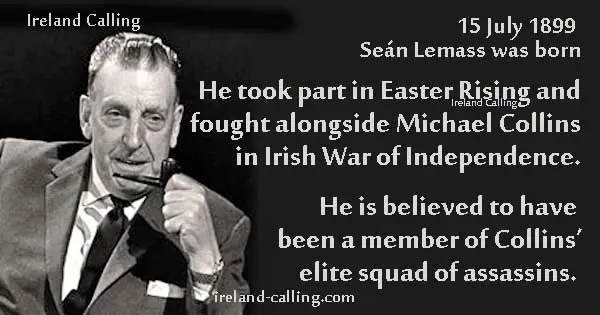
Discover how this former Easter Rising rebel helped transform Ireland from depression to a prosperity.
Click here to read more about Irish history
Click here to read more about the Irish War of Independence
Click here to read more about the Irish Civil War
Click here to read more about the Easter Rising
* * *
1919 Iris Murdoch was born in Dublin on this day in 1919. She moved to London at a young age and grew up to become one of the leading writers of the 20th century. Murdoch worked as a lecturer for many years and also had several novels published.
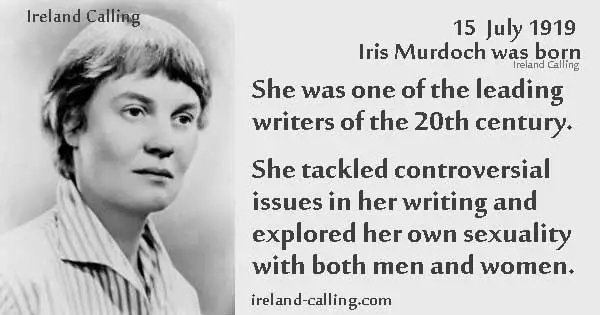
Her most famous work was the 1954 novel Under the Net, which was named as one of the best novels of the 20th century by Modern Library.
Murdoch was not afraid to tackle controversial issues in her writing and explored her own sexuality with relationships with both men and women, many of which took place after she was married.
She continued to write novels right up until the 1990s, with her last published work being Jackson’s Dilemma in 1995. Murdoch became ill with Alzheimer’s and died in 1999.
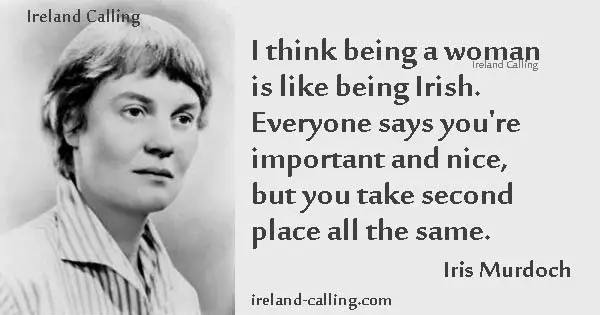
* * *
1927 Constance Markievicz died on this day in 1927. She was an Irish nationalist who fought alongside the men in the Easter Rising. She was also the first female to be elected to the British Houses of Parliament, but didn’t take her seat, in line with Sinn Féin abstentionist policy.
Markievicz was born in London as Constance Georgine Gore-Booth. Her father was an Anglo-Irish landlord who had seen the suffering of the Irish people first-hand during the Famine years. He had provided free food to the peasants on his land to try and ease their suffering. This generosity and compassion were two qualities that Constance inherited from her father.
She studied art in London and then in Paris, where she met her husband Count Casimir Markievicz. The two married and Constance became Countess Markievicz. They had a baby daughter and moved to Ireland with the Count’s son from his previous marriage.
Markievicz’s daughter was sent to be raised by her maternal grandmother, and eventually became estranged from her mother.
Markievicz became deeply involved in Irish politics and revolution. She was member of various nationalist groups, and founded Fianna Éireann, an academy for teenagers to learn about the use of firearms. This organisation became a major feeder of soldiers for the Irish Volunteers.
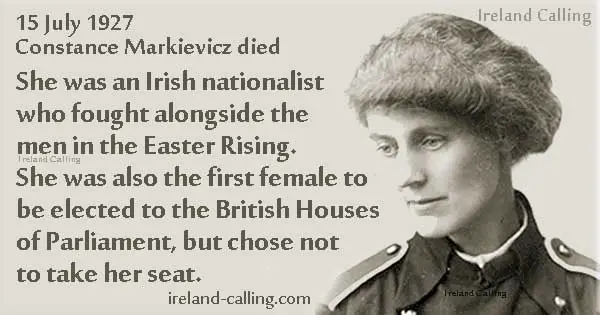
In 1916, when the Irish Volunteers rebelled against British authority and seized the General Post Office in Dublin, Countess Markievicz was second in command to Michael Mallin of the rebel troops at St Stephen’s Green. The troops held their position for six days under siege from the British forces before the order came through to surrender.
Markievicz was spared the death penalty that was handed out to many of the other rebel leaders because she was a woman. Not wanting any special treatment, she reportedly said to the court:
“I do wish you lot would have the decency to shoot me!”
Markievicz was sentenced to life in prison but was released less than a year later as the British government granted a general amnesty to those who had participated in the Rising.
She then went on to play an active role in Irish politics, and the eventual securing of independence from Britain.
Click here to read more about the Easter Rising
* * *
1943 Happy birthday to Dame Jocelyn Bell Burnell, born in Belfast on this day in 1943. She is a scientist specialising in astrophysics. Bell was part of the team that discovered radio pulsars in 1974.
A radio pulsar is a neutron star that emits a beam of electromagnetic radiation.
The supervisory scientist of the project was Antony Hewish, who was awarded the Nobel Prize for Physics along with another contributor Martin Ryle. There was great outrage at the time that Bell was not included as one of the named recipients of the award.
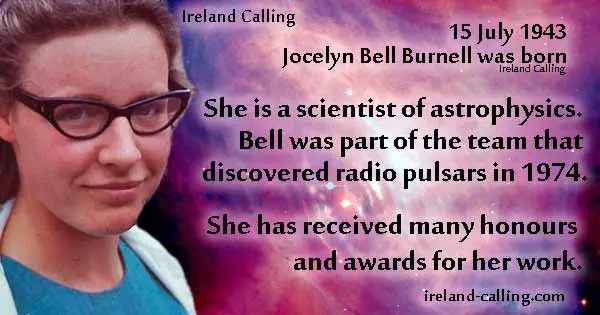
However, she remained humble and dignified regarding the omission. Several years later, Bell mentioned the prize in an after-dinner speech. She said:
“There are several comments that I would like to make on this: First, demarcation disputes between supervisor and student are always difficult, probably impossible to resolve.
“Secondly, it is the supervisor who has the final responsibility for the success or failure of the project. We hear of cases where a supervisor blames his student for a failure, but we know that it is largely the fault of the supervisor. It seems only fair to me that he should benefit from the successes, too.
“Thirdly, I believe it would demean Nobel Prizes if they were awarded to research students, except in very exceptional cases, and I do not believe this is one of them.
“Finally, I am not myself upset about it — after all, I am in good company, am I not?”
Bell has had a long and distinguished career in astrophysics and is respected and admired as one of the leaders in her field.
She was elected as President of the Royal Society of Edinburgh in October 2014.
Click here to read about more great Irish scientists
july-bottom.html